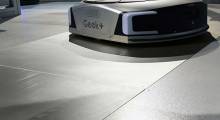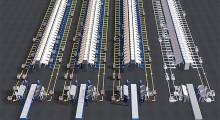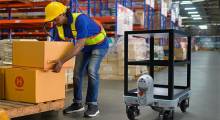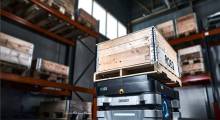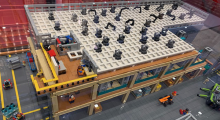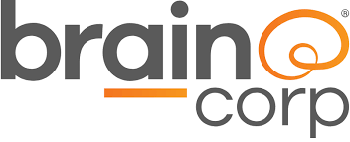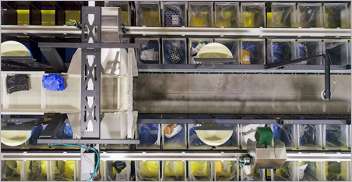Tennant Co. today said it has introduced lithium-ion technology to its portfolio of cleaning machines, including its T380AMR, T7AMR, and T16AMR. The company said the advanced battery technology and the mobile robots it has engineered with Brain Corp., will benefit customers around the world.
“Throughout its 150-year history, Tennant Co. has been dedicated to advancing the cleaning industry by relentlessly pursuing new technologies, and we are excited to continue this legacy with the addition of advanced lithium-ion battery technology to our autonomous machines,” stated Barb Balinski, senior vice president of innovation and technology at Tennant. “With longer run times and hassle-free maintenance, lithium-ion powered robotic scrubbers will help our customers increase their cleaning efficiency and optimize employee resources even more.”
Eden Prairie, Minn.-based Tennant Co. designs, manufactures, and markets cleaning systems for industrial, commerical, and outdoor environments. It had sales of $1.09 billion in 2021 and has about 4,250 employees. The company sells products directly in 15 countries and through distributors in more than 100 countries.
Tennant powers up floor scrubbers
The Tennant T380AMR is a compact, 20-in. autonomous mobile robot (AMR) designed for retail stores, hospitals, and schools.
The T7AMR is a mid-size, 26-in. floor scrubber intended for midsize-to-large spaces like larger retail stores and warehouse clubs, campuses, and some logistics facilities.
Tennant said its T16AMR is the first robotic scrubber designed specifically for industrial and warehouse spaces, with a 36-in. scrub path.
The company claimed that lithium-ion provides several benefits in comparison with flooded lead-acid batteries, including the following:
- Maximized productivity: Up to 25% to 60% more cleaning time, depending on model, which ultimately leads to more hours that employees can be redeployed to do other value-added tasks, such as stocking shelves, receiving goods, or cleaning restrooms, said Tennant. Human workers are also freed up to assist customers, staffers, or students.
- Improved uptime: Lithium-ion batteries allow opportunistic charging. Customers can plug in the robotic scrubber any time, even if the battery isn’t full discharged. This offers increased uptime of the machine, without risk of degrading the battery.
- Simplified operations: A maintenance-free battery that does not require watering helps simplify operator training and reduces the risk of operator misuse and abuse, Tennant said.
- Reduced costs: Eliminating battery watering and allowing opportunity charging can deliver operational savings, said the company. With a lifespan of 2,000 or more charge cycles, lithium-ion batteries can reduce battery replacement costs.
- Enhanced safety: There is no battery acid to worry about and no potentially harmful gases produced during charging, like lead-acid batteries.
- Sustainability: Lithium-ion batteries can reduce reliance on non-renewable natural resources and reducing carbon emissions, said Tennant.
Customers demand AMR endurance
Prior to the introduction of lithium-ion technology, Tennant’s AMR models could run on flooded lead-acid batteries for up to four hours. Customers will now have the option to choose between lead-acid and lithium-ion batteries in cleaning robots. The company said its new, lithium-ion battery option has a run time between five and 6.5 hours, depending on the model.
“Every day, we clean nearly 19 million sq. ft. of space in airports throughout the U.S., which is why we bought a fleet of Tennant’s robotic scrubbers,” said Kevin Barton, vice president of operations at FlagShip Facility Services Inc. “Our T7AMR lithium-ion machine at the Raleigh-Durham Airport [RDU] has been an incredible game-changer.”
“The autonomous floor scrubbers allow airport employees to have more time to use their skills on other important responsibilities,” he said. “Plus, with lithium-ion batteries, the machines run longer and require less maintenance—saving us money and time while providing consistent cleaning performance and a better traveler experience.”
Brain Corp welcomes new batteries
Tennant Co. and partner Brain Corp together have deployed more than 5,400 robotic cleaners, which they said is the world’s largest fleet of autonomous floor scrubbers.
“We’re very excited about the introduction of lithium-ion batteries to the fleet of Tennant AMR machines powered by BrainOS,” said Jeff Heller, senior director of product at Brain Corp. “Simply put, the more time robotic machines are running, the more productivity gains our customers can realize.”
“With BrainOS as the only platform enabling multi-purpose robotic solutions, including Tennant’s Inventory Scan, it’s now even more critical for machines to run longer so they can be utilized more frequently while employees focus on other value-added assignments,” he added.
Brain Corp said its BrainOS cloud-connected platform enables robotics developers to build scalable, self-driving robots to clean floors, move inventory, and sense environmental data—turning manual operations into automated workflows. It offers its systems through a robotics-as-a-service (RaaS) model.
The San Diego, Calif.-based company said Fortune 500 brands across multiple verticals use the growing portfolio of BrainOS-powered robots and its privacy, safety, and efficiency tools to easily manage and scale automation. Brain Corp said its software currently powers more than 16,000 AMRs.
Article topics
Email Sign Up




